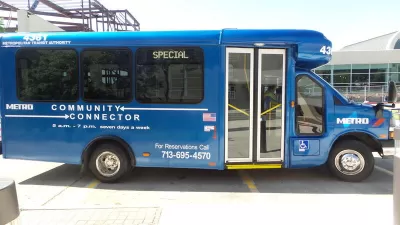On-demand technology has vastly transformed cities by changing everything from the way we shop and travel to how markets target and serve us.

Laura Bliss reflects on what on-demand technology has meant for cities and modern life over the last decade. "Our data as consumers and participants in daily life are not simply passively gathered: Consolidated, it has become the raw material for many of the products and services we buy."
But the reach of data collection extends far beyond just the consumer aspects of our lives. Smart technology tracks people as they move through physical space, public and private, and has raised a slew of questions about how urban spaces should be monitored and policed, notes Bliss.
"[Big data analytics] have also changed the significance of a basic element of what makes [these spaces] urban: dense proximity," says Bliss. Physical conglomeration is no longer a necessity to access goods and services, as companies such as Uber, Airbnb, and Amazon have aptly demonstrated.
And it is this transformation of the urban economy through technology that has been so profound, Bliss points out. "The 2010s were the decade the city became an App Store: an online marketplace where our choices were closely tracked, where that data became part of the products we were using, and where digital clusters of activity displaced real-world transactions."
FULL STORY: How the On-Demand Economy Reshaped Cities

Alabama: Trump Terminates Settlements for Black Communities Harmed By Raw Sewage
Trump deemed the landmark civil rights agreement “illegal DEI and environmental justice policy.”

Planetizen Federal Action Tracker
A weekly monitor of how Trump’s orders and actions are impacting planners and planning in America.

The 120 Year Old Tiny Home Villages That Sheltered San Francisco’s Earthquake Refugees
More than a century ago, San Francisco mobilized to house thousands of residents displaced by the 1906 earthquake. Could their strategy offer a model for the present?

In Both Crashes and Crime, Public Transportation is Far Safer than Driving
Contrary to popular assumptions, public transportation has far lower crash and crime rates than automobile travel. For safer communities, improve and encourage transit travel.

Report: Zoning Reforms Should Complement Nashville’s Ambitious Transit Plan
Without reform, restrictive zoning codes will limit the impact of the city’s planned transit expansion and could exclude some of the residents who depend on transit the most.

Judge Orders Release of Frozen IRA, IIJA Funding
The decision is a victory for environmental groups who charged that freezing funds for critical infrastructure and disaster response programs caused “real and irreparable harm” to communities.
Urban Design for Planners 1: Software Tools
This six-course series explores essential urban design concepts using open source software and equips planners with the tools they need to participate fully in the urban design process.
Planning for Universal Design
Learn the tools for implementing Universal Design in planning regulations.
Clanton & Associates, Inc.
Jessamine County Fiscal Court
Institute for Housing and Urban Development Studies (IHS)
City of Grandview
Harvard GSD Executive Education
Toledo-Lucas County Plan Commissions
Salt Lake City
NYU Wagner Graduate School of Public Service





























